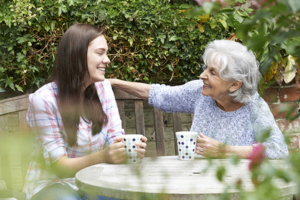Easy Tips for Being the Best Caregiver for a Senior at a Medical Appointment

Family caregivers are uniquely positioned to be the best advocates for seniors at medical appointments.
Of all of the many responsibilities a family caregiver encounters, potentially one of the most overwhelming is managing health conditions. The National Council on Aging reports that around ¾ of all seniors are clinically determined to have at least two chronic diseases, and they are seeing an average of four medical experts.
As your aging parent’s advocate, it’s very important to know how to communicate effectively with those on the older adult’s medical team, and to arrive at appointments completely prepared to address all concerns. The following four questions are a great place to start:
- Are all of these medications essential? With most seniors taking several medications, you will need to keep a detailed list and evaluate it periodically with the doctor, along with the pharmacist, each of whom will be able to make sure there aren’t any duplications prescribed by different specialists, or any contraindications between meds.
- If prescribing something new, what unwanted side effects might we expect to see? Evaluating the benefits vs. the potential health risks for any new medication is very important, as there may be situations when troublesome side effects overshadow any positive benefits. And in case the physician shares a blanket statement such as, “Most people do not encounter any problems with this medication,” make sure to follow up to learn more about people who DO encounter problems.
- What’s the most effective way to decrease pain and discomfort? We’re all familiar with the opioid epidemic, and also the risk of addiction, as well as other problems that come with taking prescription pain medications. However, unaddressed pain can bring about both slowed healing and considerable emotional stress, both for the individual experiencing pain along with his or her caregivers.
- If this were your grandfather, what would you do? Inviting the doctor to step into your shoes is an extremely helpful method to gauge the way you may wish to proceed. There may be less invasive or aggressive means to managing a problem which you might want to explore first.
To get more tips on ensuring an older adult you love receives the best possible care, get in touch with the Ft. Lauderdale caregivers at Responsive Home Care. We’re here to help through:
- Accompanying a senior loved one to healthcare appointments and procedures, making certain that questions are addressed
- Ensuring medications are taken just as prescribed
- Proactively monitoring for any changes in condition, such as medication side effects, and reporting them promptly
- Planning and preparing healthy meals and providing encouragement to stay physically active to enhance health
- And much more
Our qualified Ft Lauderdale caregivers are available across a large service area in Broward County. To get started on a better quality of life for an older adult, contact Responsive Home Care at (954) 486-6440 to request an in-home consultation and learn more about options in Sunrise for elderly care.


 We know that socialization is vitally important for our overall emotional (and even physical) wellbeing – but we also know that senior loneliness is an epidemic in America. With the hectic pace of life, it’s difficult for families and friends to provide the full measure of social interaction needed to keep isolation at bay for older adults, who are often homebound or unable to get out as much as they’d like.
We know that socialization is vitally important for our overall emotional (and even physical) wellbeing – but we also know that senior loneliness is an epidemic in America. With the hectic pace of life, it’s difficult for families and friends to provide the full measure of social interaction needed to keep isolation at bay for older adults, who are often homebound or unable to get out as much as they’d like.